To understand climate change better, we need more Greta Thunbergs, not more scientific data
- The Swedish teenager whose school strikes inspired the world made us stop and think. Climate change is undeniable and must stop being seen as contentious but, for that to happen, we need more Greta Thunbergs and their stories

We can probably agree that we have reached “Peak Greta Thunberg”. November 30 marks the first anniversary of her real introduction to the global stage, via the School Strike for Climate protests that rippled around the world.
By now though, the Swedish teenager has become a parody of herself, and her “How dare you!” speech at the United Nations Climate Action Summit in New York in September has become a global meme alongside Homer Simpson’s famous “D’oh!” and US President Donald Trump’s “fake news”.
This is not her fault. She is a dedicated, energetic and passionate young woman. Her activism has given the climate change movement the boost it sorely needed. In fact, her rise and impact have a lot to do with how the climate change lobby has failed to make traction.
Climate change has been on the world stage since the establishment of the Intergovernmental Panel on Climate Change in 1988 and its first report in 1990, which argued that human-induced global warming is real.
The wave of denialism can be traced to almost the same moment. Vested interests, greed, wilful ignorance and bloody-mindedness have reflexively concocted a wall of schoolyard “is not!” arguments based on less evidence than a Trump Twitter rant.
The denialist debate has, with the skill of an alchemist, recalibrated environmental concern into a Trojan Horse of red-eyed radicals who will leap out and take your job, rights, freedom and even your life. They have made it personal.
Which brings us back to Thunberg. Before her, who was the face of climate change: Al Gore? Leonardo DiCaprio? Come on. And what was the climate-change narrative? Meanwhile, the face of denialism was everywhere, looking back in the mirror at each individual looking for excuses.
In the 1970s, Greenpeace flipped the environmental movement on its head. Hitherto a peripheral issue pursued by a rag-tag army of hippies, environmentalism became serious, driven largely by Greenpeace’s deployment of scientific fact in its campaigns. But this tactical shift also trapped environmentalism in a science cage.
Part of the problem was that Greenpeace fell short. In an early campaign, to stop the sinking of the Brent Spar oil rig in the North Atlantic in the early 1990s, its predictions of the environmental impact turned out to be wrong. Another part of the problem is that science is expensive and corporations can pay more than anyone else for the science they want.
Denialism is built on the vast pile of fungible facts that big money, private research and sponsored reports generate through the filter of darker arts lurking in the public relations office. Like a black hole, “science” can suck in any data set or equation and make it dance and sing. Or disappear.
Climate change has surely gone beyond a talking point to the hard-edged reality we all need to somehow internalise. For that, we need ideas, not a debate. Keeping it weighted with data, resting on the furrowed brows of boffins, is a failure of the movement.
Climate change needs to cease being a contentious moment in the history of science to become a social, cultural, economic factor; a current and personal reality. It needs to be human in scale, not only to counter the propaganda of denialists but to develop a more visceral understanding of its implications and possible solutions.
Thunberg has done that for climate change. Whether her star has waned, we need people like her to apply the often confusing and alienating data in a way that generates meaning for the narrative-driven mammals we are.
A year since her appearance, we are a just little closer to a mature and nuanced comprehension of human-made climate change. Denialism is fading as the many personal stories of climate change, like Thunberg’s, sweep the landscape like tsunamis. That is perhaps her biggest achievement.
James Rose is a media adviser, strategic analyst and writer